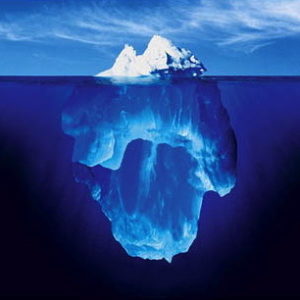Most probably you have ended up at this page because you have a ‘symptom’ of some sort: Perhaps you are struggling with depression or anxiety, or your relationship is breaking down; maybe you have been diagnosed with a personality disorder or some other psychiatric illness; possibly you are becoming aware you drink too much, or realise you rely on drugs to get through each day; perchance you feel lost or confused and find yourself thinking there has to be more to life than this.
Whatever you are struggling with, I understand the difficulty that has brought you to psychotherapy as a symptom of something hidden demanding attention within you.
I find it helpful to remember we are all a little like icebergs!
 Contemporary neuroscience has confirmed Freud’s revolutionary idea that most of the activity of our minds and brains occurs below the surface of our awareness. Common sense might suggest that an iceberg sails itself around the oceans following the trade winds; however, once we dive below the surface of the ocean, we understand how the invisible ocean currents drive these castles of ice as they meander towards their watery extinction. Similarly we like to think we are the conscious masters of our own destinies, however there is compelling evidence that, despite our best intentions, our course through life is shaped by unconscious forces deep within us.
Contemporary neuroscience has confirmed Freud’s revolutionary idea that most of the activity of our minds and brains occurs below the surface of our awareness. Common sense might suggest that an iceberg sails itself around the oceans following the trade winds; however, once we dive below the surface of the ocean, we understand how the invisible ocean currents drive these castles of ice as they meander towards their watery extinction. Similarly we like to think we are the conscious masters of our own destinies, however there is compelling evidence that, despite our best intentions, our course through life is shaped by unconscious forces deep within us.
These unconscious forces that shape our life are unknown to us by definition. People often come to psychotherapy saying they know they are this or that way because of their parents, siblings, teachers, or something that happened to them, but I regard these assertions with some suspicion because if they really knew they probably would not have the symptoms any more! We give ourselves reasons for why we are the way we are so we don’t have to become aware of something we don’t want to know about.
Discovering the unconscious is a little like being a tracker or a mountain guide. A tracker has developed a special awareness of the smallest of signs: An upturned pebble in a river-bed that has partly dried out not only alerts them to the path someone has taken but also the extent of its drying is a guide to how long since they passed this way. Similarly the way you enter my room, the words you use, your slips of tongue, my responses (thoughts, feelings, bodily sensations) may all be considered as possible communications from your unconscious.
Sorry this page is a work in progress ... I am busy with patients, but will be back to write soon ...